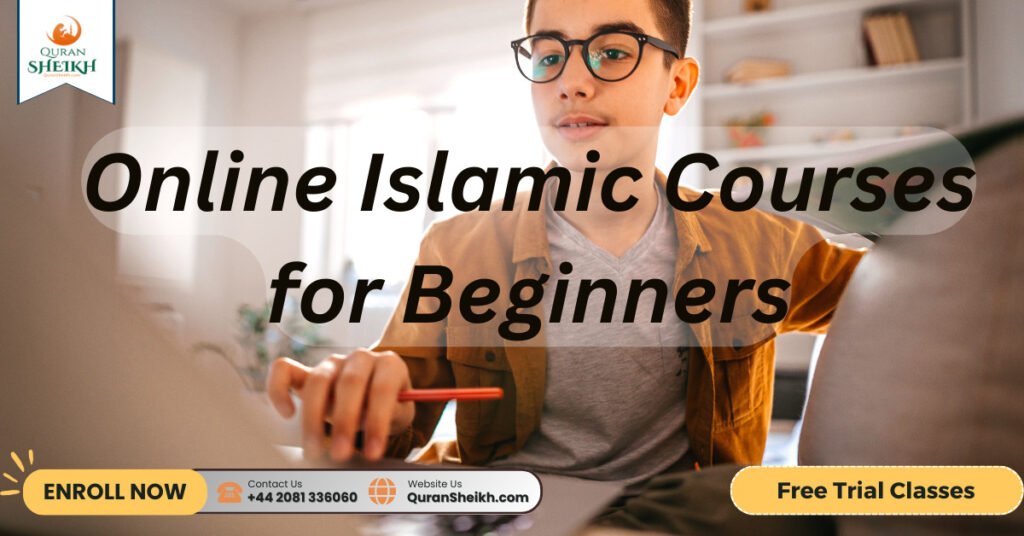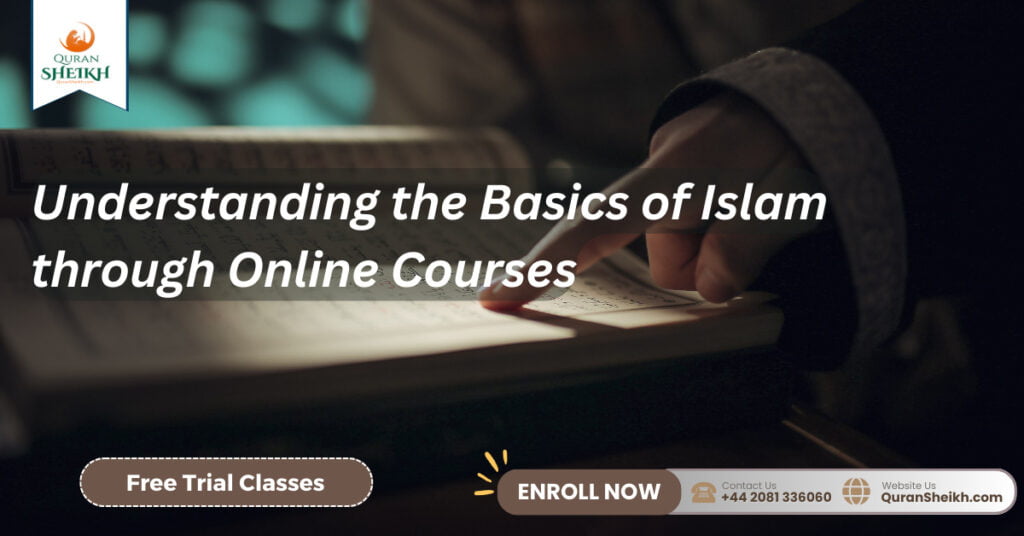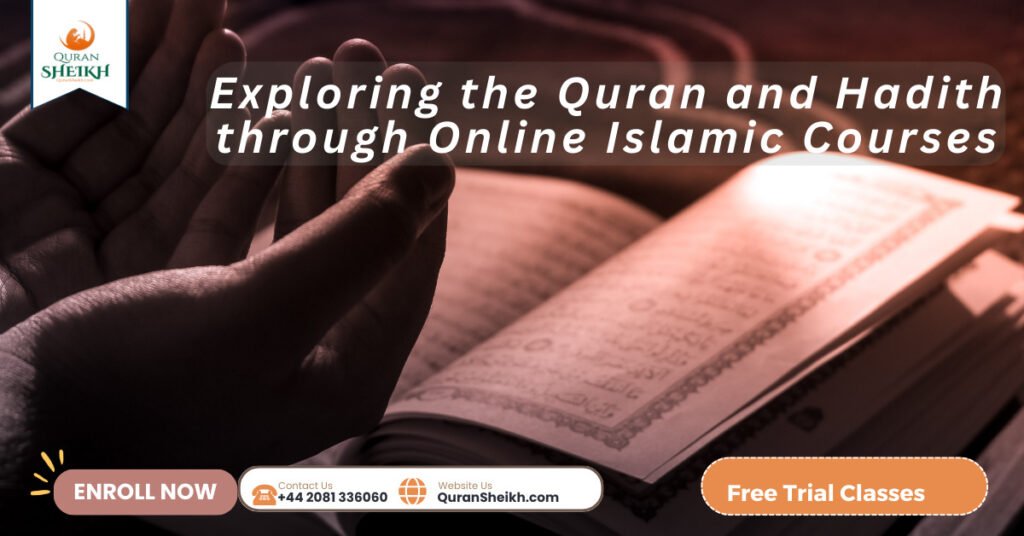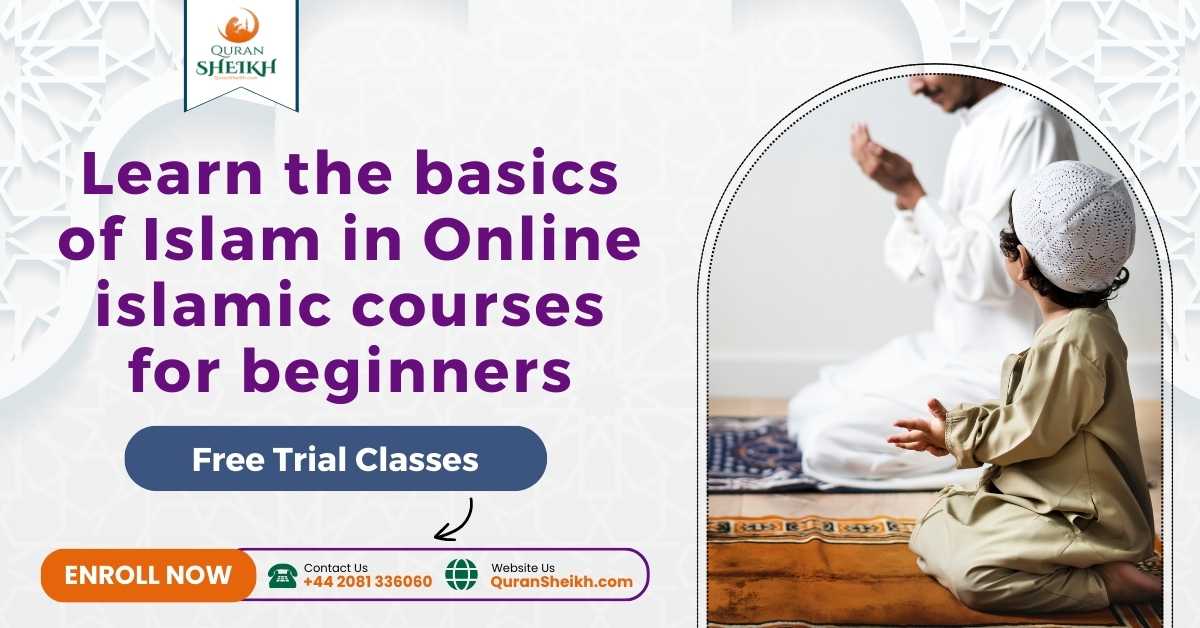Islam is renowned for promoting peace and unity through its legacy of culture and history. For newcomers to the faith, understanding such a complex religion can be a challenge. Thanks to the rise of digital Islamic education, it is now effortless.
Online Islamic courses offer a comprehensive and convenient way for beginners to learn about Islam’s basics, beliefs, and practices. They provide access to expert and qualified teachers, flexible learning options, and cost-effective solutions.
This article focuses on the advantages of taking online Islamic courses for beginners. It also looks at various courses available to help you find the best one for your education needs.
Join thousands of Muslim Families who love learning Quran, Arabic and Islamic Studies from the comfort of their Homes.
Introduction to Online Islamic Courses for Beginners

To make learning about Islam more approachable, beginners can enhance their understanding by participating in an online Islamic course.
Expand your understanding with online courses taught by reputable Islamic scholars and teachers offering knowledge, skills, and insights.
By taking online courses, you have the freedom to learn at your preferred speed and timing without being tied down by physical classroom settings.
The flexibility provided enables you to attain Islamic education virtually from any part of the world.
What are Online Islamic Courses and Why are They Useful for Beginners?
Muslims can acquire a comprehensive Islamic education by taking part in online courses. These courses cover Quranic studies, Hadith traditions, Islamic beliefs and practices, history, and other relevant topics.
These courses are often conducted via live video sessions, pre-recorded videos, and other educational materials and resources. The accessibility of these courses is one significant benefit, thanks to their availability on any device with an internet connection.
These courses possess a distinct advantage for individuals new to Islam who lack convenient access to learning resources on the religion in their vicinity.
By taking an online course, novices can receive knowledge about Islam in a relaxed ambiance from their own abode and at their own speed.
Understanding the Basics of Islam through Online Courses

A strong grasp of the foundational aspects of Islam is essential when beginning your journey of Islamic education. Online Islamic courses for beginners provide just that, and are structured to cover the fundamental aspects of Islam. These courses typically cover the following topics:
Introduction to Islamic Beliefs and Practices
To embark on your Islamic education journey, having a solid comprehension of the religion’s fundamentals is crucial. Additionally, it encompasses Islamic customs such as Salah, Sawm, and Hajj.
History of Islam and its Development
The scope of this course encompasses an in-depth study on the emergence and evolution of the Islamic religion, tracing its footsteps to its current global popularity and comprehension of its development.
Comparing Different Islamic Sects and their Beliefs
Islam has various sects, each with its own interpretation of Islamic teachings. This course section highlights the differences between these sects and their beliefs.
Quran Memorization Course Online with an Arab teacher with 30% Off
Exploring the Quran and Hadith through Online Islamic Courses

The Quran and Hadith are two important sources of Islamic knowledge, and online Islamic courses for beginners often place a strong emphasis on these texts. This section of the course includes:
Introduction to the Quran and its Significance in Islam
In this class module, one can gain an appreciation for the Quran, comprehend its place within Islam and grasp the underlying core values which guide it.
Deciphering the Interpretation of the Quran through Tafsir
The Quranic interpretation course section extensively explores the study and comprehension of the Quran, comprising its interpretation methods and techniques.
Introduction to Hadith and its Role in Islamic Law
Containing the words and deeds of Prophet Muhammad, the Hadith stands as a significant source of Islamic wisdom. Exploring the Hadith, its place in Islamic law, and the methods used to study and interpret it is the main focus of this course section.
Learning Arabic Language and its Significance in Islamic Studies
In the study of Islam, Arabic plays a crucial part due to its status as the language of the Quran. Online Islamic courses for beginners often include a course section on Arabic language, which includes:
Introduction to Arabic Language and its Importance in Understanding Islam
This course section provides an understanding of the Arabic language and its importance in studying Islam. It includes an overview of the Arabic alphabet, pronunciation, and basic grammar.
Basic Arabic Grammar and Vocabulary for Beginners
Within this course segment, students will gain insight into Arabic grammatical structures and vocabulary, encompassing prevalent Islamic phrases and words.
Reading and Understanding the Quran in Arabic
This section teaches students how to read and understand the Quran in Arabic, including comprehension of the Quranic vocabulary and grammar.
The Importance of Ethics and Morals in Islam for Beginners
Introduction to Islamic Ethics and Morals
Ethics and morals play a fundamental role in the Islamic faith. Muslims must live by the values and principles in the Quran. Additionally, they must follow the traditions set by the Prophet Muhammad (peace be upon him). Islamic ethics and morals guide Muslims to be humane, just, and honest in all facets of their lives.
Understanding the Importance of Honesty, Justice, and Mercy in Islam
Honesty, justice, and mercy are some of the essential values emphasized in Islam. Honesty is considered the foundation of all virtues because it promotes trust and integrity. Justice and fairness are also key principles that Muslims are required to uphold in their dealings with others. Mercy and compassion are equally significant as they promote forgiveness, kindness, and empathy towards fellow human beings.
Applying Islamic Ethics and Morals in Daily Life
Applying Islamic ethics and morals in daily life can help Muslims lead a more fulfilling and meaningful life. This involves treating others with compassion and respect, being honest in all dealings, and striving for justice and fairness in all situations.
It also means being mindful of one’s actions and intentions, adhering to Islamic values and principles, and seeking guidance from Islamic scholars and teachers.
Engaging in Community and Social Activities through Online Islamic Courses
Introduction to Community and Social Activities in Islam
Community and social activities are essential components of Islamic tradition. Muslims are encouraged to engage with others, share knowledge, and work towards common goals. Online Islamic courses offer a platform for learners to connect with like-minded individuals and participate in community and social activities.
Participating in Online Discussions and Forums
Online courses provide learners with opportunities to engage in discussions and forums with fellow students and experts in Islamic studies. This can help learners gain a deeper understanding of Islamic principles and values, and also broaden their perspectives. Participating in discussions and forums can also foster a sense of community and camaraderie among learners.
Connecting with Other Students and Experts in Islamic Studies
Online Islamic courses provide learners with access to experts and qualified teachers who can guide them in their learning journey. Learners can also connect with other students and form study groups to discuss coursework and exchange ideas. This can create an environment for learners to support and motivate each other, which can help them stay focused and engaged in their studies.
Finding the Right Online Islamic Course for Beginners
Assessing Your Learning Needs and Goals
Before enrolling in an online Islamic course, it’s essential to assess your learning needs and goals. This involves determining your level of proficiency, understanding the subject matter you want to learn, and the level of commitment and time you can devote to studying.
Researching and Comparing Different Online Islamic Courses
Researching and comparing different online Islamic courses can help you identify the best course that meets your learning needs and goals. This involves considering the course content, the expertise of the teachers, the accreditation of the institution, and the cost.
Choosing the Right Course and Getting Started
After researching and comparing different online Islamic courses, it’s time to choose the right course and get started. Enrolling in the course and familiarizing yourself with the learning platform can help you stay organized and focused on your learning goals.
Benefits of Online Islamic Courses for Beginners
Flexible Learning Options and Scheduling
Online Islamic courses offer learners flexible learning options and scheduling. This means learners can learn at their own pace and schedule their learning around their daily routine and commitments.
Access to Expert and Qualified Teachers
Online Islamic courses provide access to expert and qualified teachers who can guide and support learners in their learning journey. This ensures that learners receive high-quality education and instruction.
Affordability and Cost-effectiveness
Online Islamic courses are often more affordable and cost-effective than traditional classroom-based courses. A wider variety of pupils who lack the monetary resources for a traditional course can now partake due to this.
Online Islamic courses offer a matchless and invaluable chance for newbies to apprehend the basics of Islam.
Enrolling in online courses grants you access to exceptional resources, professional guidance, and a community that is eager to support your quest for knowledge on Islam. An excellent starting point to explore the Islamic faith and its beliefs and practices is through online courses.
With adequate classes, devotion, and persistence, one has the opportunity to enhance their comprehension of Islam and emerge as an informed and well-versed community member.
What is the basic Islamic Studies course?
The basic Islamic Studies course is a comprehensive introduction to the religion of Islam. It covers a wide range of topics, including the history of Islam, its core beliefs and practices, and its impact on the world. The course is designed to help students develop a deeper understanding of Islam and its role in society.
The course typically begins with an overview of the history of Islam, from the life of the Prophet Muhammad to the present day. Students learn about the major events and figures in Islamic history, as well as the different branches and schools of thought within Islam.
The course also explores the core beliefs and practices of Islam, such as the oneness of God, the prophethood of Muhammad, and the five pillars of Islam. Students learn about the meaning and significance of these beliefs and practices, as well as how they are reflected in the lives of Muslims around the world.
In addition to the core beliefs and practices of Islam, the course also examines the impact of Islam on the world. Students learn about the contributions of Muslims to art, science, literature, and philosophy. They also learn about the role of Islam in social and political movements.
The basic Islamic Studies course is an important resource for anyone who wants to learn more about Islam. It is open to students of all backgrounds and faiths, and it is taught by experienced and qualified instructors.
How can I practice Islam?
Islam is a religion that teaches its followers to live in harmony with God and with each other. There are many ways to practice Islam, but some of the most important include:
- Prayer: Muslims pray five times a day, facing in the direction of Mecca. Prayer is a way to connect with God and to ask for His guidance and help.
- Charity: Muslims are required to give a portion of their wealth to charity each year. Charity is a way to help those in need and to show compassion for others.
- Fasting: Muslims fast during the month of Ramadan. Fasting is a way to discipline oneself and to learn the importance of self-control.
- Pilgrimage: Muslims are required to make a pilgrimage to Mecca at least once in their lifetime, if they are able. The pilgrimage is a way to unite with other Muslims from all over the world and to experience the oneness of God.
In addition to these specific practices, Islam also teaches its followers to live a good and moral life. This means being kind and compassionate to others, being honest and trustworthy, and avoiding harmful things like alcohol and drugs.
Here are some additional tips on how to practice Islam in a more human and unique way:
- Find a community: Worshiping with other Muslims is a great way to stay connected to your faith and to learn more about Islam.
- Read the Quran: The Quran is the holy book of Islam, and it contains all of the guidance that you need to live a good and moral life. Read the Quran regularly and reflect on its meaning.
- Seek knowledge: Islam is a religion that encourages its followers to learn and to grow. Seek out opportunities to learn more about Islam and about the world around you.
- Be kind and compassionate: Islam teaches that all people are equal in the eyes of God. Be kind and compassionate to everyone, regardless of their race, religion, or social status.
Practicing Islam is a journey, and there is no right or wrong way to do it. The most important thing is to be sincere in your efforts and to try your best to live a life that is pleasing to God.
What are the fundamentals of Islamic theology?
The fundamentals of Islamic theology are based on the Quran and the Hadith. The Quran is the holy book of Islam and is believed to be the word of God. The Hadith are the sayings and actions of the Prophet Muhammad.
One of the most important concepts in Islamic theology is Tawhid, or the belief in one God. Muslims believe that God is the creator and sustainer of the universe, and that He is all-powerful and all-knowing.
Another important concept in Islamic theology is Risalah, or the belief in prophets. Muslims believe that God has sent prophets throughout history to guide humanity. The Prophet Muhammad is believed to be the last and greatest prophet.
Muslims also believe in the Day of Judgment, when all people will be judged by God for their deeds in this life. Those who have lived good lives will be rewarded with Paradise, while those who have lived bad lives will be punished in Hell.
The fundamentals of Islamic theology are complex and nuanced, but these are some of the most important concepts.
Best Quran memorization program with qualified Arab tutors and get 30% OFF, Quran classes for Kids
FAQ
What are the benefits of online Islamic courses for beginners?
Online Islamic courses offer a more convenient and accessible way for beginners to learn about Islam. They offer learners access to top-notch resources, professional advice, and an encouraging environment that allows for self-paced growth in their comprehension of Islam.
What kind of courses can beginners find online?
Newcomers have access to a vast selection of internet-based Islam courses that delve into diverse themes, including the fundamentals of Islam, its evolution, Holy Quran and Hadith, Arabic language proficiency, conduct and values, alongside communal and sociable endeavors within Islam.
Are online Islamic courses for beginners affordable?
Yes, online Islamic courses for beginners are often more affordable than traditional courses since they do not require additional expenses like transportation, textbooks, and accommodation. Furthermore, many online courses offer discounts and scholarships to help learners with financial constraints.
How can beginners choose the right online Islamic course?
Beginners can choose the right online Islamic course by assessing their learning needs and goals, researching and comparing different courses, and selecting one that fits their budget and schedule. To gauge the courses quality and effectiveness, it’s beneficial to peruse reviews and ratings shared by prior learners.


